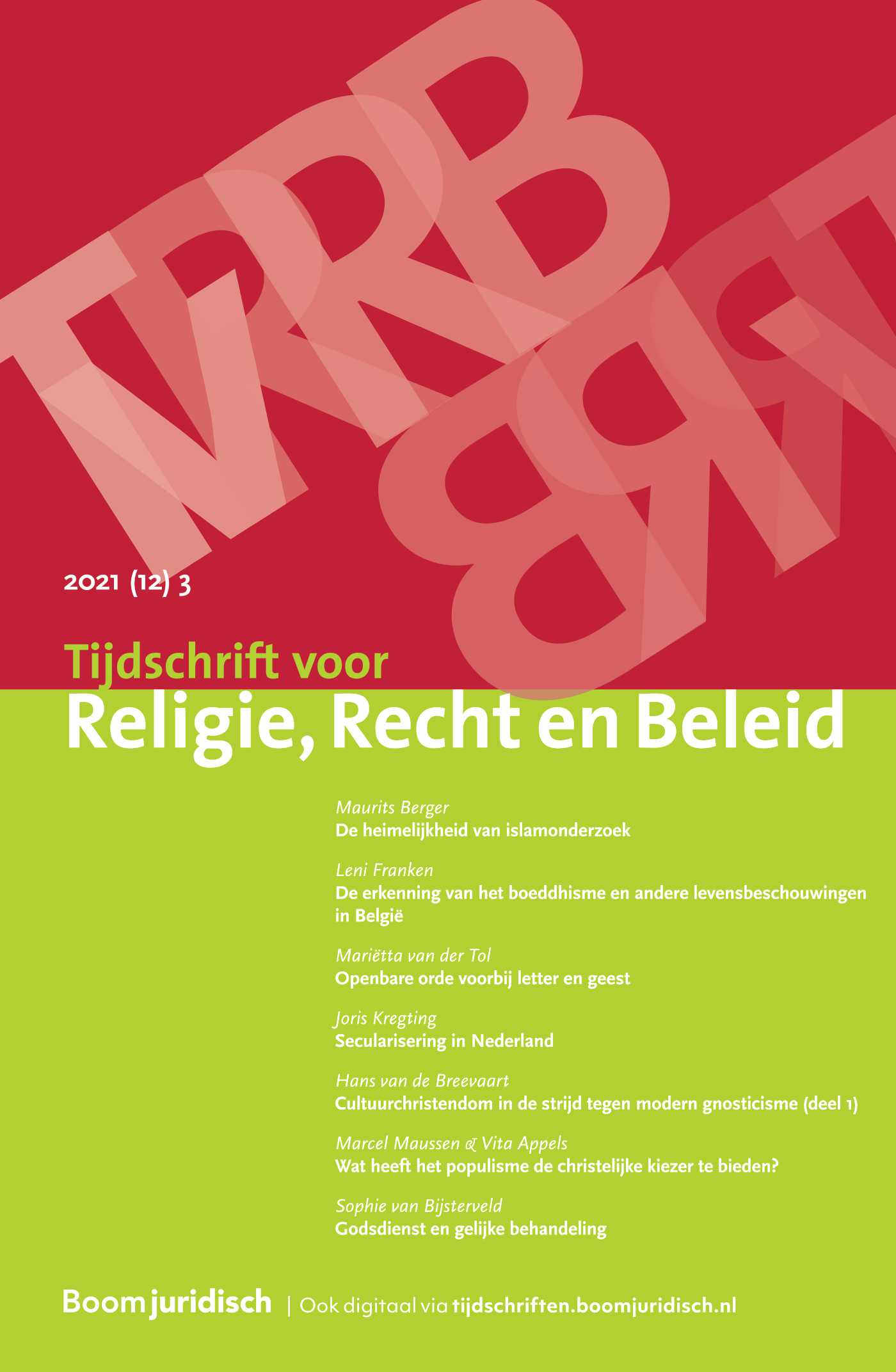|
This article explores the role of autonomy in the debate surrounding euthanasia in advanced dementia. Which type of autonomy should carry more weight? Should that be the precedent autonomy, as expressed in the living will? Or does a person with dementia retain the right to contemporary autonomy? The Regional Euthanasia Review Committees appear to prioritize precedent autonomy. This thinking originates in the work of the American legal philosopher Ronald Dworkin. The question arises if and how contemporary autonomy can be shaped in the case of dementia. We discuss the role that spiritual caregivers can play in this regard. |


Tijdschrift voor Religie, Recht en Beleid
Meer op het gebied van Algemeen
Over dit tijdschriftMeld u zich hier aan voor de attendering op dit tijdschrift zodat u direct een mail ontvangt als er een nieuw digitaal nummer is verschenen en u de artikelen online kunt lezen.
| Overwegende ... |
‘Alles is politiek, maar politiek is niet alles’ |
| Auteurs | Karim Schelkens |
| Auteursinformatie |
| Artikel |
|
| Trefwoorden | euthanasie, dementie, autonomie, wilsverklaring |
| Auteurs | Helene Timmers en Annemarieke van der Woude |
| SamenvattingAuteursinformatie |
| Jurisprudentie |
Gaat welzijn van dieren boven godsdienstvrijheid van mensen? |
| Trefwoorden | godsdienstvrijheid, joodse en islamitische religieuze slacht, Conventie als ‘levend instrument’, beperkingsgrond ‘goede zeden’, dierenwelzijn |
| Auteurs | Matthijs de Blois |
| SamenvattingAuteursinformatie |
|
In order to promote animal welfare, the regional legislators in Flanders and Wallonia have recently adopted rules that require animals to be stunned prior to slaughter. These rules put an end to the previously existing exception for (Jewish and Muslim) religious slaughter. In this judgment, the European Court of Human Rights ruled that, although this infringes on freedom of religion, this may be justified as necessary in a democratic society for the protection of morals. The interpretation of the ECHR as a ‘living instrument’ can not only lead to a broadening of the freedom of the citizen, but also to an expansion of the possibilities of restricting religious freedom in this case due to recent shifts in moral views in society. This undermines the guarantee of fundamental rights in the Convention. This is a cause for concern when it comes to religious freedom in a highly secularised society. |
| Artikel |
Wat nu, als de openbare school niet meer zou bestaan?Over de voortgaande tendens tot het verdwijnen van verschillen tussen openbaar en bijzonder onderwijs |
| Trefwoorden | state school, non-state school, freedom of education, freedom of religion |
| Auteurs | Paul Zoontjens |
| SamenvattingAuteursinformatie |
|
The Netherlands is well known by its system of funded state and non-state schools. The freedom of civilians to found their own (religious) non-state schools is in theory ‘backed’ by a network of state schools, that are generally accessible and neutral in their education. Parents who can’t register their child on a non-state school, because of its restrictive access policy on religious grounds, or don’t want their child to go to it, always have the alternative of choosing a state school. But this delicate constitutional balance doesn’t exist anymore. Over the years state schools have been privatized, governed as they are now by private law foundations without sufficient guarantees for their state character. On a lot of issues, such as: accessibility, neutral character, legal position of the personnel and curriculum, state schools don’t differ from the vast majority of non-state schools anymore. What does this situation of a presence of, in actuality, only non-state schools mean for our concept of freedom of education? In general, government has to keep more distance to the system than it does now. As a consequence the arguments of non-state schools to select pupils at the gate become weaker. Also the principle of offering religious education on state schools is on the way. |
| Artikel |
Informeel onderwijs onder overheidstoezichtAan de oever van de Rubicon |
| Trefwoorden | informal education, Constitution, freedom of education, freedom of religion and belief, freedom of expression and freedom of association |
| Auteurs | Paul van Sasse van IJsselt |
| SamenvattingAuteursinformatie |
|
In recent years, debate has arisen as to whether some form of substantive standardisation and government oversight is warranted for informal education. That debate was prompted by suspicions that some institutions would play a negative role in conveying values such as freedom, equality and solidarity. Policy letters outlining the first contours for supervision of informal education give little reason to be reassured that a constitutionally tenable proposal is in sight. Major tensions arise with Article 23 of the Constitution (freedom of education), freedom of religion and belief, freedom of expression and freedom of association. I consider this development unnecessarily risky for the democratic rule of law and the government's ability to act. There are sufficient instruments to tackle practices that are punishable or contrary to public order. Let the government focus on those and not overplay its hand. |
| Artikel |
Levensbeschouwelijke kentekens op openbare scholenEen Europese en internationaalrechtelijke analyse |
| Trefwoorden | hoofddoek, leerlingen, onderwijs, neutraliteit, secularisme |
| Auteurs | Sien Devriendt en Mirjam van Schaik |
| SamenvattingAuteursinformatie |
|
The pluralistic society poses challenges for public educational institutions. This article analyses UN rulings and ECtHR case law regarding the wearing of religious symbols by pupils and students in public education. The aim is to provide a frame of reference for national policy and practice in the field of public education. |

